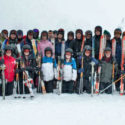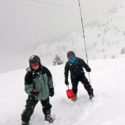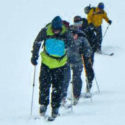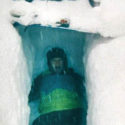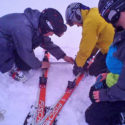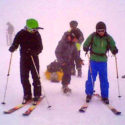Late in March this year, the North West Officer Training Regiment embarked on what has become an annual week-long expedition to the French Alps – this year in Les Contamines – to undertake Alpine ski and Ski touring training at 3 levels: Ski foundation (SF) 1, 2 and 3. The aims and objectives of such an expedition are to test the OCdt’s in both a physical and mental capacity, whilst at the same time gaining them military Skiing qualifications that will eventually lead them on to an instructor course. Whilst SF1 is more about teaching the basics of Alpine skiing, with introductions touring equipment, SF2&3 work on developing these skills but with a particular emphasis on touring, testing teamwork and physical robustness more profoundly.
48 personnel arrived in Les Contamines for 6 days skiing in exceptional snow for so late in the season. Day 1 was a familiarisation with the aim of everyone getting their ‘ski legs’ back, albeit with varying degrees of success! For some of the complete beginners, this was a baptism by fire, or rather a baptism by freezing blizzard, as conditions on the mountains were severely overcast with very limited visibility and snow flurries. Unfortunately, this was to set the precedent for the week, as all but one day midweek were affected by such weather conditions. Whilst this saved beginners from the inevitable facial sunburn, it did however make it that much harder to safely navigate the slopes with their fledgling skills. One of the huge benefits from these testing conditions though, was the noticeable increase in the confidence that OCdt’s had in their skiing abilities as the week progressed, and it was rewarding to know that rather than shy away from these cold and adverse conditions, with no exceptions all members of the expedition had risen to the challenge and were achieving the aims of their particular qualification, and more.
As the week progressed, the SF2 and 3 groups were being given the benefit of their instructors’ vast experience, and were taking on board many different aspects of preserving life in a winter mountain environment – everything from finding and digging out an avalanche victim, to digging snow holes in which to shelter from the weather. In addition to this, the OCdt’s were learning technical aspects of winter mountaineering, such as digging out a Rouche block to test the snow pack. In order to get to snow deep enough to facilitate such tests and digs, it was necessary to tour to more remote parts of the mountainside, a technique that requires no small amount of grit and stamina. Touring is a particularly effective way of getting a skier to remote parts of a mountainside under his own impetus. By attaching an adhesive ‘skin’ to the base of each ski, and adjusting the boot bindings to allow the heel to be raised, the skier can effectively walk himself up the steepest of ski gradients, the friction from the skin countering the natural glide that a ski achieves on snow.
With all groups putting in at least around 7 hours of solid skiing every day, the strain on equipment at times became apparent, with a couple of broken bindings, brakes and poles. However, by using the screwdrivers found at some ski lifts, and spare parts that group members were carrying, repairs were for the most part able to be carried out there and then. With an effective communications network between groups, those repairs that could not be carried out slope-side were taken down in a gondola to a ski maintenance shop at the base of the mountain, and in all cases the skier in question was back on the slopes within half an hour. The plan for the students on the Ski foundation 3 course to complete a Multi day tour was unable to go ahead after getting advice from the local ski patrol – this was due to the condition of the snow pack at night.
In terms of the value gained by the unit as a whole, it now has more than 40 qualified skiers, who are competent enough to be part of a group, and are knowledgeable in basic avalanche training. At a more advanced level, the unit now has 6 members who are ready to go forward to do their Ski Leader 1 – the first level of Ski instructor, which would allow them to instruct on future expeditions. The value gained by the individuals that I spoke to was apparent in their self-confidence by the end of the week, and from watching them execute more complicated skiing manoeuvres than they had been able to at the beginning. In all, a physical and testing week, mostly in poor weather, that saw all come through with more experience and confidence. The Exercise would not been able to go ahead with out the help and support of the Ulysses Trust.
OCdt Russ Pettitt

